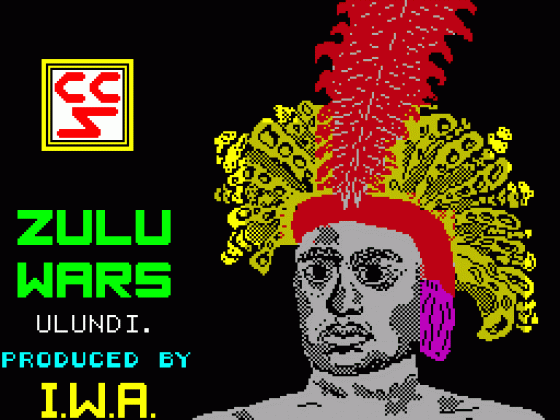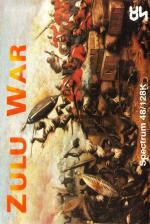
Crash
 1st June 1987
1st June 1987
Categories: Review: Software
Author: Philippa Irving
Publisher: Cases Computer Simulations
Machine: Spectrum 48K
Published in Crash #41
Zulu War
This latest game from CCS takes a little-exposed conflict between the British and the Zulu tribes towards the end of the nineteenth century for its scenario, which I can't help welcoming as a change from the endless re-enactments of the Second World War which, after four months of editing Frontline, are beginning to make me feel as if I'm trapped in a recurring time loop.
On the other hand, there's little point in novelty for its own sake. Each game must stand on its own merits, independent of previous releases. Zulu Wars uses its scenario to work some interesting and novel elements into the gameplay, and with two separate programs, one on either side of the tape, it would seem to offer value for money too: but it 's let down, as far too many wargames are, by shoddy unprofessional programming.
There are two scenarios which must be loaded separately, and one - the easier, Umlalazi - is based on a battle which Just might have happened, but didn't. Although I'm all for speculative wargaming, this suggests to me that the potential of the historical material is limited somewhat; particularly when it turns out that the start-up conditions of the battle on the first side of the tape have had to be tweaked considerably to give the Zulus any chance at all. Zulu Wars might be more accurately titled 'Variations on the Zulu Wars'!

Still, it's an academic exercise anyway to believe that little boxes on a computer screen bear anything more than a numerical resemblance to what really happened on the battlefield, and although I'm strongly in favour of as much historical backing in the packaging as possible to assist this act of faith, an approximation is always inevitable. The leaflet that comes in the standard double cassette box describes the political situation in Africa which led up to the outbreak of the wars, and the specific conditions of each scenario, in a concise but adequate way. The Zulu Wars were caused by British imperialistic ambition in the twentieth century, or rather the curious British belief prevalent then that only they were competent to 'keep the peace' in Africa; on this occasion, between the Boers of The Transvaal and the Zulus of Zululand, which was recognised by Britain as a sovereign state. In 1879, the British moved into annexe Zululand and met a well-organised native army which, despite its strength and tactics, ended up as cannon-fodder to the technological might of the Empire. This outcome was entirely predictable and although, as I say, the balance has been un-historically redressed, this is still one of those wargames it's difficult to lose.
For reasons which become apparent once play has started, and is for once excusable, there is no two-player option or choice of side. The player takes command of the British forces, under General Chelmsford in Ulundi and Major- General Crealock in Umlalazl, against the computer, which controls the Zulus. Play takes place on a small scale, the screen representing, in curiously distorted perspectives, individual buildings and foliage on the battlefield. The units themselves are shown not as traditional, symbolic boxes but as a matrix of little stick men which dwindle, rather alarmingly, as damage is incurred.
In the first scenario the player has 13 blocks of stick men to march against the Zulus, and they're often difficult to manoeuvre through closely-placed obstacles, or indeed past each other. The clumsiness of the British movement is irritating only before It becomes apparent that it's part of the gameplay: historically, it represents the regimentation and rigid formation of the British troops, and in game terms it gives the Zulu forces an advantage to compensate for the player's superior firepower.
The units have a fixed efficiency rating and a fluctuating morale rating, and a number of movement points based on their efficiency. When each unit is highlighted in turn by the computer the name of the regiment is displayed along with a bar-chart of these simple statistics, and reference to a list in the rules gives the exact number of men in it. This list, which even tells the curious what the regiment's present designation is, is the sort of helpful, easy-reference feature that I 'm always glad to see in a rulebook.
Three difficulty levels are offered, which simply determine how many hundreds and thousands of Zulus you get thrown at you. At Full Battle level the figure is 40,000 spear-waving warriors against 5,300 infantry and 900 cavalry! Once the difficulty level has been selected, the games start automatically; and so do the Impressions of tackiness and awkward programming. The player is treated to a demonstration of the appalling scrolling routine, which chums the map laboriously back and forth across the screen in the most incompetent and flickering way I've see on a recent game. But this is a wargame, not Uridium, and so, generously recognising this is trivial - a matter of aesthetics, really - the player might be annoyed to discover this ugly routine is the only way of viewing the map available. It cannot be scrolled under the player's control, only by a single keypress which gives a repetition of the guided tour.
Movement and combat for the British is combined into the same phase, and the computer selects units in turn for attention. Fortunately, a selected unit can be passed until later. The units are all crowded together and getting in each other's way at the start of the scenario, so this system becomes laborious and fiddly, but also creates an atmosphere of inflexibility which no doubt reflects the battle tactics of the British forces at the time; and the system itself is quick enough to operate once you've got used to its idiosyncracies.
All units can fire once in a round, and can engage in close combat as they come into contact with the enemy. As the game progresses, the physical size of the units diminish because of losses and this affects directly - in a visible way - how much damage they can do by firing into the Zulus. Gunfire is the player's most effective weapon against the Zulu hordes, because they have no guns themselves and so no way of retaliating in the same combat. Close combat can prove dangerous, although the British still have the advantage over the Zulus; the morale of a unit starts to decrease if they take more losses than their opponent, and the lower the moral, the more likely defeat becomes.
Once movement and combat is completed to the player's satisfaction, the return can be ended and the Zulus begin to move. This is when it becomes obvious why the game is one-player only, with no choice of sides; the Zulu movement is radically different from the British. Instead of attacking in clumsy rectangles, they swarm individually onto the screen and around the British regiments like ants; they start in struggling waves but soon break up to envelope the player's units, one stick man at a time. This is the novel element of Zulu Wars, and it represents a fair attempt at figures wargaming on the computer in a limited, one-sided way. It would be difficult for a human player to move these large numbers of figures individually unless the overall standard of game design were very much better than this. But Zulu Wars has to be noted as one of the few games which makes use of the computer's abilities to do something a bit more imaginative than calculating damage.
The British victory conditions are simply to kill all of the Zulus, and it is supposedly the Zulu's aim to kill the leader in each scenario. This is something they do not pursue, however, with any enthusiasm and the only threat to the British lies in the sheer numbers of the enemy. The Zulu pattern of attack is predictable and always identical - they come in from three sides of the map in an attempt to envelope the British, then move in to surround each regiment - and, after a few attempts, I came to realise that there's little scope for variety of tactics. The battle formation of the troops is predetermined and there's too little space to move imaginatively, for within three moves of the start you're so overwhelmed by the Zulus that it's just a case of wearing them down.
The programming is unacceptably inconsiderate in places - for instance, in the Zulu combat phase the program solemnly scrolls around to each British unit to decide whether it's under attack or not - and although it's never actually slow enough to make me reach for the plug, I am beginning to get depressed by the standard of some software turned out professionally packaged by respectable companies. A computer-literate friend hacked into Zulu Wars for me on the suspicion that it was In BASIC, and came out with the conclusion that it looked like it had been put through a BASIC compiler.
It's playable enough, but has little depth and nowhere to go. The higher levels offer no extra complications, just more and more swarming Zulus to outlive. This game would have been more acceptable at a budget price.
Other Reviews Of Zulu War For The Spectrum 48K
Zulu War (Cases)
A review by Richard Blaine (Your Sinclair)
Zulu War (Cases)
The British Empire attempts to strike back
Zulu Wars (Cases)
A review by Jack Daniel (Sinclair User)
Zulu War (Cases)
A review
Zulu War (Cases Computer Simulations)
A review
Other Spectrum 48K Game Reviews By Philippa Irving
Scores
Spectrum 48K Version| Presentation | 39% |
| Rules | 70% |
| Playability | 72% |
| Graphics | 66% |
| Authenticity | 70% |
| Opponent | 65% |
| Value For Money | 59% |
| Overall | 61% |













